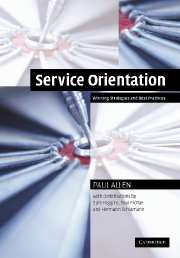Book contents
- Frontmatter
- Contents
- Foreword
- Preface
- Acknowledgments
- List of acronyms and abbreviations
- PART 1 OVERVIEW
- 1 Basics of service orientation
- 2 Execution management
- 3 Business process management
- PART 2 BUSINESS ARCHITECTURE
- PART 3 SERVICE-ORIENTED ARCHITECTURE
- PART 4 SERVICE-ORIENTED MANAGEMENT
- PART 5 CASE STUDIES
- References
- Useful sources of information
- Index
2 - Execution management
from PART 1 - OVERVIEW
Published online by Cambridge University Press: 31 July 2009
- Frontmatter
- Contents
- Foreword
- Preface
- Acknowledgments
- List of acronyms and abbreviations
- PART 1 OVERVIEW
- 1 Basics of service orientation
- 2 Execution management
- 3 Business process management
- PART 2 BUSINESS ARCHITECTURE
- PART 3 SERVICE-ORIENTED ARCHITECTURE
- PART 4 SERVICE-ORIENTED MANAGEMENT
- PART 5 CASE STUDIES
- References
- Useful sources of information
- Index
Summary
Web services in context
Your early attempts at service orientation are likely to be within the organization firewall, aimed at low-risk demonstrations of business capability, and involve modest numbers of users. These early solutions may well expose legacy systems in the form of software services, but without great heed to the scalability of these services. If successful, there will soon be pressure to scale up those early solutions to cater for mission critical functionality over larger groups of users. It is Web services that provide the group of emerging technology standards necessary to industrialize your services. There is a core group of established Web services standards that are required to climb the first rung of the adoption ladder. Other emerging Web services standards are required to progress further.
At the same time, as transactions grow larger and more frequent, their execution must be carefully monitored and controlled, in line with the specification of the service. Security becomes an ever-increasing concern, too, as we saw in chapter 1, as the company extends its reach beyond the firewall to more and more external users and partners. While Web services standards are necessary to deal with these issues, good execution management becomes increasingly important as your organization moves upward through the technology adoption curve, across increasingly complex distributed networks.
“Yes,” we hear top management say, “but if this stuff needs to be ramped up we'll just outsource it to the experts.
- Type
- Chapter
- Information
- Service OrientationWinning Strategies and Best Practices, pp. 22 - 41Publisher: Cambridge University PressPrint publication year: 2006



